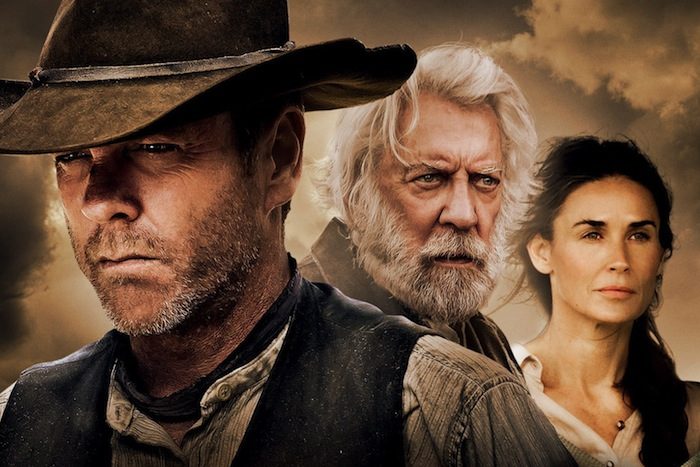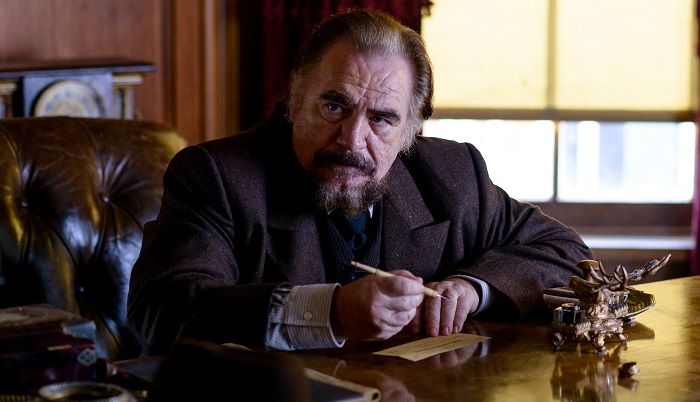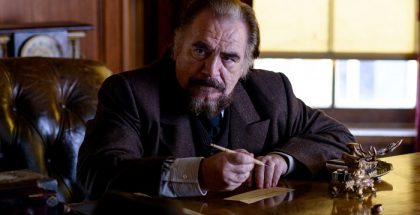Interview: Brian Cox talks Forsaken, Netflix and turning down Game of Thrones
Matthew Turner | On 04, Jul 2016
Donald Sutherland and Kiefer Sutherland share the screen for the first time in Jon Cassar’s brooding Western. A story of an estranged father and son’s reunion, the mending of old wounds and searching for redemption while tensions run high in a community besieged by ruthless land-grabbers, the stellar cast is completed by Demi Moore and Brian Cox, who plays ruthless local businessman James McCurdy.
We sit down with Brian Cox to talk reuniting with Kiefer, streaming things on Netflix and turning down Game of Thrones.
How did you get involved with the film?
Well, I’m a friend of Kiefer’s – we did a play together on Broadway and we became firm friends doing that. He told me he was going to do this project with his dad and he asked me if I’d be interested in being in it. He said there’s this part that’s kind of the heavy in it, and I said, ‘Sure’. It was really to do with a father and son project. It was very much to do with the kind of relationship between a father and a son and that was the reason I did it.
I think that’s the chief appeal of the film to audiences, is seeing Donald Sutherland and Kiefer Sutherland on screen together…
They’ve had their moments in the past, Donald and Kiefer, they’ve been estranged at times and come together at times. It’s been a pretty fiery relationship, so that’s very much reflected in the movie, but the love in the movie – I think that’s what’s rare about it, the love between the father and the son, the love which is finally unconditional, despite [everything] – you may not like your son or you may not like your dad, but you do love them, you do love each other and that’s, I think, what’s very powerful. For me, the thing I’ve found, the most telling moment in the film is the moment when they’re sitting in the church and Kiefer suddenly puts his head on his father’s chest and starts to weep and you suddenly see this kid, he suddenly becomes this little boy, and it’s quite heartbreaking and so truthful and so honest. He’s a wonderful actor, Kiefer, he really is, he’s a proper actor, there’s no question about it and that was the thing that I really found extraordinary about the film and I felt that this was ultimately a great film to have been part of.
What kind of research did you do?
Research? I learned my lines and rode my horse! I mean, I was raised on those movies and I also spent a year working with David Milch on Deadwood, so I knew what kind of the harshness was involved with those characters, particularly characters like McCurdy – those characters are endlessly repeated in Deadwood, what with Hearst and what with Swearengen, all these guys that are sort of power hungry in some way or other and trying to build up their power base. It’s a kind of archetypal character in a way, the guy who wants to take over and run the whole show and McCurdy is very much part of that genre. So it wasn’t too difficult a character to realise. And it was also well written. Of course, I had all the bad language, which people find, ‘Ooh, no swearing’, but actually the truth of the matter is that the language of that time was either the Bible, Shakespeare or cuss words. A combination of all three.
The film hints at a backstory between your character and Donald’s – did you work out what that was between you, or was it established beforehand?
There was another scene. It’s a while since I did it, but when I saw the film, I remember that we had two scenes, Donald and I – we had a really good scene that you didn’t see. We had an earlier scene that touched on their relationship much more, in the fact, that they were people who were from the same roots, as it were, they all came from the same town and they kind of built up and just went off on various different tangents. That was clearer, but I think that scene just came out because it probably wasn’t serving the narrative as well as the other stuff.
How do you feel about watching your own performances?
The only reason I watched it was I hadn’t seen it and I thought I should take a look at it, actually really not from my performance point of view, but I wanted to see Kiefer and Donald, I wanted to see the work that was going on there and, unfortunately, I had to encounter myself at the same time. It’s always odd watching yourself. It’s very strange because you’re like this creature, you don’t quite understand what’s happening. I mean, I always say, it’s hard enough doing it without having to watch it. My wife, she’s the one that always says, ‘Brian, you must watch it, you must watch it’, and I go, ‘Well, I’m not sure about watching it’, and occasionally I’ll go and watch it and go, ‘Oh, that’s not bad’, and then I’ll think, ‘Oh no, I don’t want to know about that, let’s just do it, let’s do it’, I only want to do the doing of it, you know?
And I’m not one of these – you get these actors who are endlessly looking at the monitor to see what they’ve done, when they play the scene back, and I’m going, ‘It’s done now, you’ve done it, you can’t do anything about it – you’re going to be as bad as you were when you did the scene or you’re going to be as good, but it’s done – why are you watching the monitor?’ And they think, well, we can always learn, but you never do learn, the whole internal process has been so entirely different from the external process, it’s a whole different ballgame, as it were. So I’m a bit wary of watching. I like to watch comedy stuff, because I like to see if it works with an audience, so it’s quite good, if I’m aiming for a laugh, and it’s nice to know, ‘Oh, yeah, the audience got that’, which is just a technical thing more than anything else. But I wouldn’t have watched Forsaken for me, I watched it for certainly Kiefer and certainly Donald.
I thought Michael Wincott was wonderful too…
Oh, and Michael! Michael is fantastic! I mean, what an actor, Michael, with that voice, that voice he’s got. He’s classic, Michael, I mean, he should be doing a lot more than he does, Michael because he’s got that kind of great delivery about him. He does a lot of voiceovers, quite rightly, because he’s got this amazing voice, amazing instrument that feeds him well. And he’s a very funny and very nice guy as well.
And Kiefer’s line, ‘You don’t have to run, Dave, you can walk…’
Exactly. And it did have that old style western feeling, which you don’t get [these days]. It was pictures like this that I was raised on, so that was the other reason I wanted to be part of it, because it’s an homage to a whole genre that, sadly, they don’t do as many as they should do. And it’s also the story of America, the story of the chancers that made America. Donald Trump is still alive and well in the last century.
What was Jon Cassar like as a director?
Fantastic. Fantastic. I thought he was so on the money, speedy – you know, he’s a guy who’s worked in television for years, with all the benefits of television, all that sense of immediacy that television can do. He’s a bit of an unsung hero, Jon Cassar, because he virtually invented the whole 24 thing, he was the guy who put it on the screen and made it work. I’ve just been working another guy like him called Jonathan Teplitzky, and they are just worker directors, they’re kind of unsung heroes, they’re not auteurs, but just really good directors, and Jon is smashing, I’d work with John anytime. Anytime.
Are you much of a VOD watcher yourself? What have you been watching recently?
Yeah, I am. I have a Netflix account – unfortunately I haven’t managed to see very much in recent times, because I’ve been working. I’m a great Game of Thrones fanatic, so I tend to watch that on playback, but I haven’t been able to see any [films for a while]. I mean, the whole thing’s being revolutionised as we speak with Amazon Prime and Netflix, it’s all kind of changing, the whole thing. But there’s still nothing like sitting in the darkened room and the lights go down and you’re sitting there with a bunch of people, watching something.
How important do you think stuff like Netflix and Amazon are to films like Forsaken?
Well, I think they are incredibly important, but the problem is the hog-tying of the cinemas, cinemas are hog-tied by the distributors and by the powers that be, so that you go to the cinema and you have to go to, I don’t know, The Avengers or X-Men 4 and I find that so irritating now. Cinema is so dictated to you, that to find a movie like Forsaken in the cinema is almost impossible.
But thank God for Netflix, and of course, more and more people are watching things [that way], but I miss the community aspect of watching stuff. You know, I go back a long way, I’m a child of the 50s, I saw movies in the 50s, where I used to go to the cinema and it was, my local – in my hometown, at one time, there were 21 cinemas, and in my street, there were two cinemas in the back street of me, Arthurstone Terrace, and there were double features and they changed mid-week, so you had four films on at the beginning of the week and four films on at the end of the week. So you had eight movies in one week that you could go and see in the cinema, and that was truly phenomenal. And as a kid, I was an avid film-goer, I probably spent too much of my life in the movies. I still love the movies and I do love the fact that you can download and watch it, so I love all that aspect – I love anything that keeps the industry alive, and as long as Netflix and Amazon Prime keep the industry alive, that will be fine, but I do not like the distribution monopoly and how they have five screens showing the same movie.
I’d like much more of a choice when I go to the cinema. When I lived in L.A., there was a place called the Sunset Six, which was on the corner of Sunset Boulevard, and it was all independent movies and you could go there and you could get, in one week, six independent movies and it was fantastic. It was just a fantastic resource, and you’d go as and when with an audience and they were always full, always full. And I miss that aspect, I miss that aspect of cinema, the social side of it. And I think a lot of what’s been going on has kind of killed that. So in a way, thank God for Amazon, thank God for Netflix, because otherwise you’d be in a terrible state. And I think this is kind of as a result of people not being able to get access to certain films, so there is a kind of library that you can get hold of and say, ‘Yeah, yeah, okay, we want to see a film like Forsaken, we can get it on Netflix, which is great, we can get it on Amazon Prime, which is great’. So in that sense, one has to be grateful.
What’s your next project?
Well, I’ve just finished doing Churchill, playing Churchill, which was great. I’ve got a film about to be released called The Carer, which gets released in London in August and that’s getting released in the States and going into a few festivals. It’s about an old actor who’s got Parkinson’s. And Churchill is about Churchill around about D-Day, it’s all about how he tried to avert the D-Day landings, which has only become common knowledge in recent times. And then I’ve got another film which is called The Etruscan Smile, which I made at the beginning of this year, which is about a dying man going to visit his son in San Francisco which was quite an elaborate film, produced by this amazing fella called Arthur Cohn, who’s 89. And I’m going to do the sequel to Super Troopers, which I start at the end of August. So I’m quite busy.
You mentioned Game of Thrones. Would you be in it, if they asked you?
Well, stupidly, I turned it down in the early days because they didn’t pay enough money [laughs]. Now they have more money. And I was silly. I was silly, it was silly, because I’m a complete addict now. But I don’t know what I could play. Maybe I could do – I mean, I just watched my friend Ian McShane, and I thought, ‘Ooh, Ian’s in it’, so I settled down to watch him. And I thought, ‘Ian did that?’ and immediately I thought, ‘God, they must have paid him well’, because I know Ian! [laughs]
And there was Max von Sydow doing that character that he did, so in a way, it’s attracting certain people who do film, and, of course, I’ve got friends like Clive Russell and Liam Cunningham and Charlie Dance is an old pal, being in it and they had a great time in it. But now I know what they spend on it, in terms of the visual aspect of it, like in last week’s episode – I haven’t seen this week’s yet, in fact I was about to watch it, I’m going to get it on the HBO download. But last week’s episode was phenomenal, and it was just phenomenal in terms of – it beat out – you know, if you think of The Hobbit or you think of The Lord of the Rings, the battle sequence in Game of Thrones was a lot more modest, but much more brilliant than any of the battle sequences in any of those movies and all those kind of CGI characters doing their bit, whereas this was real people, I mean, the CGI was just brilliantly done and clearly there was a bit of green screen, but it’s astonishing. For television, it is truly astonishing.
I mean, I know they spent six weeks filming that sequence, which is good now, it’s great that they’ll do that, and they’ll do that with a show that successful – of course if a show’s going down the tubes, it’s cancelled, like, sadly they’ve cancelled Penny Dreadful, which I’m in, I was in the last series just briefly, I played the father of the Wolf Man, it was good stuff and I enjoyed it. But I’m still waiting for the call for Game of Thrones and if they’ve got more decent money, I’ll be there!
Forsaken is available on Sky Cinema. Don’t have Sky? You can also stream it on NOW, as part of a £11.99 NOW Cinema Membership subscription – with a 7-day free trial.





















